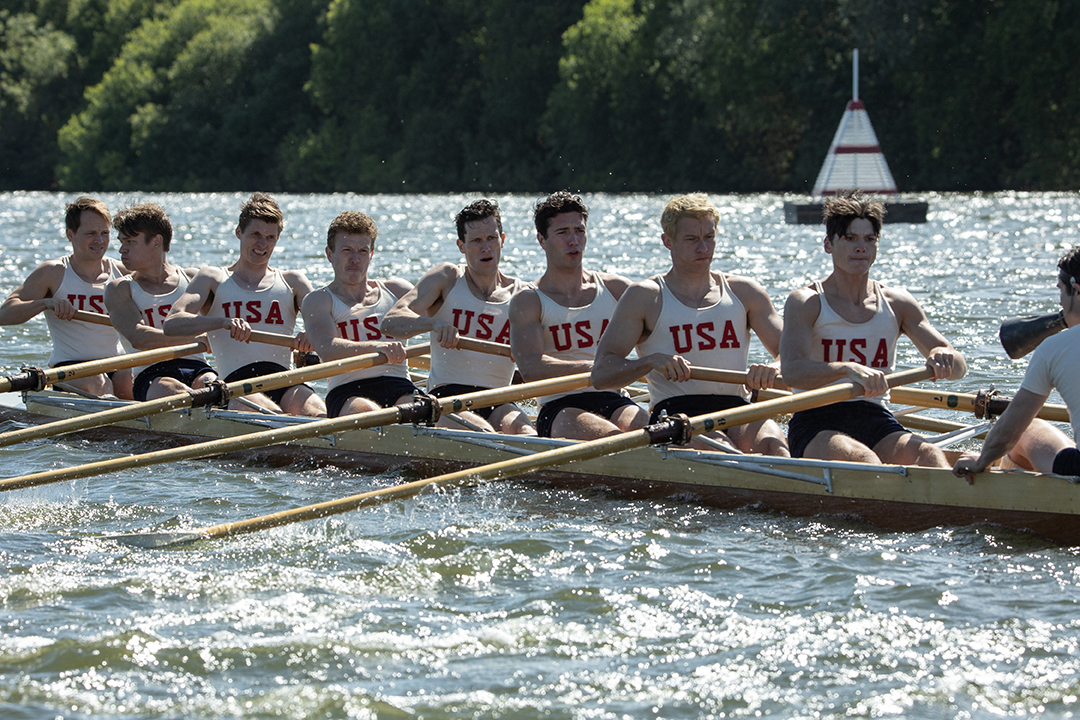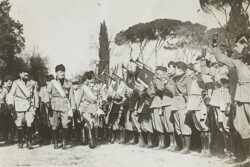With expensive equipment, a need for a body of water, and a history tied to elite English private schools, rowing—often grouped with sports like polo, golf, and sailing—has historically been seen as the recreation of the upper class.
And yet in the midst of the Great Depression, it was eight working-class rowers attending not one of the U.S.’s elite East Coast universities, but rather the University of Washington (UW), who dominated nationwide regattas and went on to win gold at the 1936 Berlin Olympics.
Adapted from the 2013 non-fiction book of the same name, The Boys in the Boat (2023), coming to theaters this Christmas, tells the story of how these eight students were selected out of a tryout pool of 175 students for the UW rowing team and went on to become one of the best eight-man crews of all time.
The film is informative without being overly didactic; the audience learns the basics of rowing alongside the eponymous boys in the boat—the majority of whom had never rowed before—and are left with enough of the requisite knowledge to understand the training sequences and enjoy the anticipation of the regattas.
Although the tension leading up to the team’s Olympic victory lacked the real-time sense of uncertainty, as their historic win is quite well-known and included in the film’s marketing, the film’s race scenes remained rivetingly engaging. Using a diverse array of shots of the boats on the water to spotlight different aspects of the race and a vibrant musical score by Alexandre Desplat, the scenes were infused with the excitement of race day.
While the film emphasized the importance of teamwork—eight-man crew, after all, can only be done with eight men—it lacked the feel of a true ensemble movie, with the focus centered around rower Joe Rantz (Callum Turner). With little information on the lives of the rest of the boys in the boat, the sense of camaraderie and teamwork the film attempted to convey failed to come through.
Rantz’s life, however, is not uncompelling: as a working-class engineering student who was one missed tuition payment away from dropping out, Rantz’s catalyst for trying out for the rowing team was the job and room that came along with a spot on the boat.
Coming of age during the Great Depression, Rantz’s early life was defined by hardship, with his mother dying when he was young and his father leaving when he was a teenager to find work in a different city. Rantz’s pain over being abandoned by his father tugs at him throughout the film, but is quickly resolved after a chat with the team’s boat designer and builder George Pocock (Peter Guinness).
His trauma over being abandoned and shame over his lower-class background threaten his concentration in the boat, but are resolved swiftly to keep the two hour film moving. These narrative choices keep the pace from dragging, but also detract from the depth of Rantz’s character by quickly moving past his inner conflicts. In one scene, one of his teammates calls him “Hobo Joe,” nearly provoking a fight, only for the teammate to immediately apologize in the following scene and admit that his financial situation isn’t much different from Rantz’s.
And indeed it is not. All of the rowers come from working-class backgrounds, and only one of them had ever rowed before earning a spot on the team. Rantz’s story—though not a carbon copy—serves as a stand-in for the rest of his teammates, showing how they all faced economic struggles, the likes of which their wealthier competitors could never imagine.
Although less focus was placed on the rest of the rowers, there were a few scenes that showcased the team’s friendship and brought an inviting warmth to the film. In one scene, after a victory over rival UC Berkeley, they celebrate at a dance and convince their shyest teammate (Jack Mulhern) to play the piano for the dance hall. This moment is called back to later in a crucial moment during the film’s pivotal Olympic race, when the boat’s coxswain (Luke Slattery), taps the melody of the song Mulhern played onto the side of the boat to encourage him to speed up his strokes.
Throughout the film the crew’s dissimilarities from the rowers at other universities are repeatedly emphasized. They are one of two public West Coast universities competing at the Poughkeepsie Regatta and one of the least experienced crews, compared to their competitors who were, as their veteran coach Al Ubrickson (Joel Edgerton) puts it, “in boats before they were in shoes.” They are frequently referred to as “kids,” and their inexperience is feared as a weakness, even as they break records. Even after their victory in the Poughkeepsie Regatta clinches them a spot in the Olympics, US Rowing tries to derail them by demanding they pay their way to Berlin—a $5,000 trip, the equivalent of a hefty $110,450 in today’s currency—and condescendingly reassures them that the U.S. will still send a boat–one rowed by the preferred, wealthier University of Pennsylvania team–if they cannot pay their fees, emphasizing the elitism present in this sport.
The Boys in the Boat is an underdog story, not just of Rantz, but of all the boys in the boat. By situating them in an economic competition as well as an athletic one, their victory takes on additional significance for those who share their (worn) shoes: for working-class boys who have been doubted their whole lives, for the have-nots in the midst of the Depression, and for the overlooked Pacific Northwest in early 20th century America.
Although the film’s lack of focus on the other UW rowers detracts from its marketing’s promise to tell the story of the entire team, the emphasis on their underdog status and the lingering focus on their victory at the end brings a sweetness to the film that is just enough to make you forget that you don’t know most of the rowers’ names.
They are, as one radio announcer in the film puts it, “a boat full of underdogs representing an underdog nation.”







